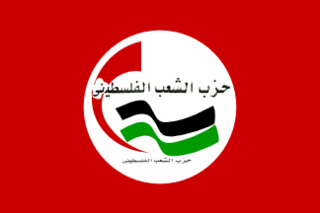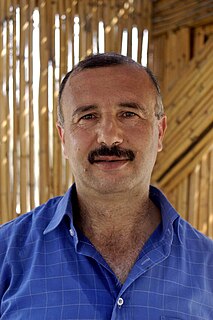
The West Bank, also referred to by some Israelis as Judea and Samaria, is a landlocked territory near the coast of the Mediterranean in Western Asia. It is bordered by Jordan and the Dead Sea to the east and by Israel to the south, west, and north. Under an Israeli military occupation since 1967, its area is split into 165 Palestinian "islands" that are under partial civil administration by the Palestinian National Authority (PNA), and 230 Israeli settlements into which Israeli law is "pipelined". The West Bank's borders also include the lands that comprise East Jerusalem.

Arab–Israeli peace projects are projects to promote peace and understanding between the Arab League and Israel in different spheres. These are part of a broader attempt at a peace process between Palestinians and Israelis. Sponsors of such projects can be found both in Israel and Palestine.

The economy of the State of Palestine refers to the economic activity of the State of Palestine.

The Israeli–Palestinian peace process refers to the intermittent discussions held by various parties and proposals put forward in an attempt to resolve the ongoing Israeli–Palestinian conflict. Since the 1970s, there has been a parallel effort made to find terms upon which peace can be agreed to in both the Arab–Israeli conflict and in the Palestinian–Israeli conflict. Some countries have signed peace treaties, such as the Egypt–Israel (1979) and Jordan–Israel (1994) treaties, whereas some have not yet found a mutual basis to do so.

The Palestinian People's Party, founded in 1982 as the Palestinian Communist Party, is a socialist political party in Palestine and among the Palestinian diaspora.

Jerusalem International Airport, is a regional airport, currently not in use, located between Jerusalem and Ramallah. When it was opened in 1924 it was the first airport in the British Mandate for Palestine.

The Quartet on the Middle East or Middle East Quartet, sometimes called the Diplomatic Quartet or Madrid Quartet or simply the Quartet, is a foursome of nations and international and supranational entities involved in mediating the Israeli–Palestinian peace process. The Quartet comprises the United Nations, the United States, the European Union, and Russia. The group was established in Madrid in 2002, recalling Madrid Conference of 1991, as a result of the escalating conflict in the Middle East.
Local councils are one of the three types of local government found in Israel, the other two being cities and regional councils. There are 124 local councils in Israel.
The Palestine–Israel Journal is an independent, non-profit, Jerusalem-based quarterly that aims to shed light on and analyze freely and critically, the complex issues dividing Israelis and Palestinians. In 2006 it was a candidate for the UNESCO-Madanjeet Singh Prize for the Promotion of Tolerance and Non-Violence and was recognized with a mention of honor for "its outstanding contribution to this great cause". In 2012, co-editors Hillel Schenker and Ziad Abuzayyad were awarded the Outstanding Contribution to Peace Award at the eighth International Media Awards held on May 5.

Ameinu is an American Jewish Zionist organization. Established in 2004 as the successor to the Labor Zionist Alliance, it is the continuation of Labor Zionist activity in the United States that began with the founding of Poale Zion, which came together in the period 1903-1905.

The Peres Center for Peace, located in Jaffa, Israel, is an independent non-profit, non-governmental, and non-political organization founded in 1996 by Nobel Peace Laureate and former President of Israel Shimon Peres. Its aim is to further Peres' vision of people in the Middle East working together to build peace through socio-economic cooperation and development and people-to-people interaction.

India–Palestine relations, also known as Indian-Palestinian relations or Indo-Palestinian relations, refers to the bilateral relations between India and Palestine. These relations have been largely influenced by the independence struggle against British colonialism. India recognized Palestine's statehood following declaration on 18 November 1988; although relations between India and PLO were first established in 1974.
The water resources of Palestine are fully controlled by Israel and the division of groundwater is subject to provisions in the Oslo II Accord.

Nader Al-Khateeb is the General Director of the Water and Environmental Development Organization (WEDO), a non-profit Palestinian organization that promotes a number of environmental programs and projects centered on water quality control, water conservation, wastewater treatment and reuse, as well as solid waste management and recycling. He was also the Palestinian Director of EcoPeace Middle East. EcoPeace Middle East is a unique regional organization that brings together Jordanian, Palestinian and Israeli environmentalists to promote sustainable development and advance peace efforts in the Middle East. It has offices in Amman, Bethlehem and Tel Aviv, employs 40 paid staff and actively involves hundreds of volunteers.

The Center for Jewish-Arab Economic Development (CJAED), located in Herzliya Pituach, Israel, is a non-profit, non-governmental organization founded in 1988 by Ms. Sarah Kreimer and a coalition of Jewish and Arab businesspeople. CJAED works to promote Jewish-Arab economic cooperation as well as develop a thriving Arab sector in order to establish peace, prosperity and economic stability in Israel and the region. The center’s main premise is that Israel's primary resource is its people, therefore a vibrant and stable economy requires an integrated society. In 2010, CJAED was recognized as one of the "Ten Top Israeli Business Ventures" that promote peace in the Middle East.

Bilateral relations between the India and Syria are historic where the two have ancient civilisational ties. Both countries were on the silk route through which civilisational exchanges took place for centuries.
The Valley of Peace initiative is an effort to promote economic cooperation between Israel, Jordan, and Palestine based around efforts and joint projects in the Arava/Arabah Valley, along which runs the southern portion of the Israel - Jordan border. It received the personal attention and support of Shimon Peres, President of Israel. The initiative involved ongoing joint efforts by regional leaders to launch joint new industrial and economic projects, which will create new local businesses and job growth, and promote ongoing cooperation.

Israel–Palestine relations refers to the political, security, economical and other relations between the State of Israel and the State of Palestine. Israel and the PLO began to engage in the late 1980s and early 1990s in what became the Israeli–Palestinian peace process, culminated with the Oslo Accords in 1993. Shortly after, the Palestinian National Authority was established and during the next 6 years formed a network of economic and security connections with Israel, being referred to as a fully autonomous region with self-administration. In the year 2000, the relations severely deteriorated with the eruption of the Al-Aqsa Intifada – a rapid escalation of the Israeli–Palestinian conflict. The events calmed down in 2005, with reconciliation and cease fire. The situation became more complicated with the split of the Palestinian Authority in 2007, the violent split of Fatah and Hamas factions, and Hamas' takeover of the Gaza Strip. The Hamas takeover resulted in a complete rift between Israel and the Palestinian faction in the Gaza Strip, cancelling all relations except limited humanitarian supply.

Mitvim – The Israeli Institute for Regional Foreign Policies, is a think tank based in Israel. Mitvim's goals are to develop and promote a new, progressive foreign policy paradigm for Israel; to promote Israel's belonging in the region and to reshape its relations with countries in the Middle East, Europe, and the Mediterranean; and to advance Israeli–Palestinian peace.

Israeli–Palestinian economic peace efforts refers to efforts to promote joint economic projects between Israelis and Palestinians, as a pathway to reach peace between the two groups.













